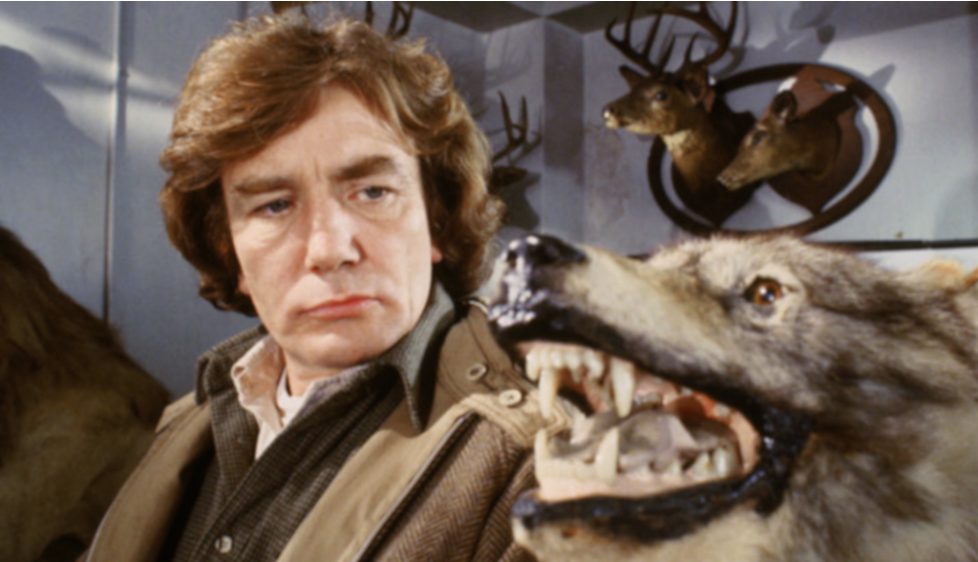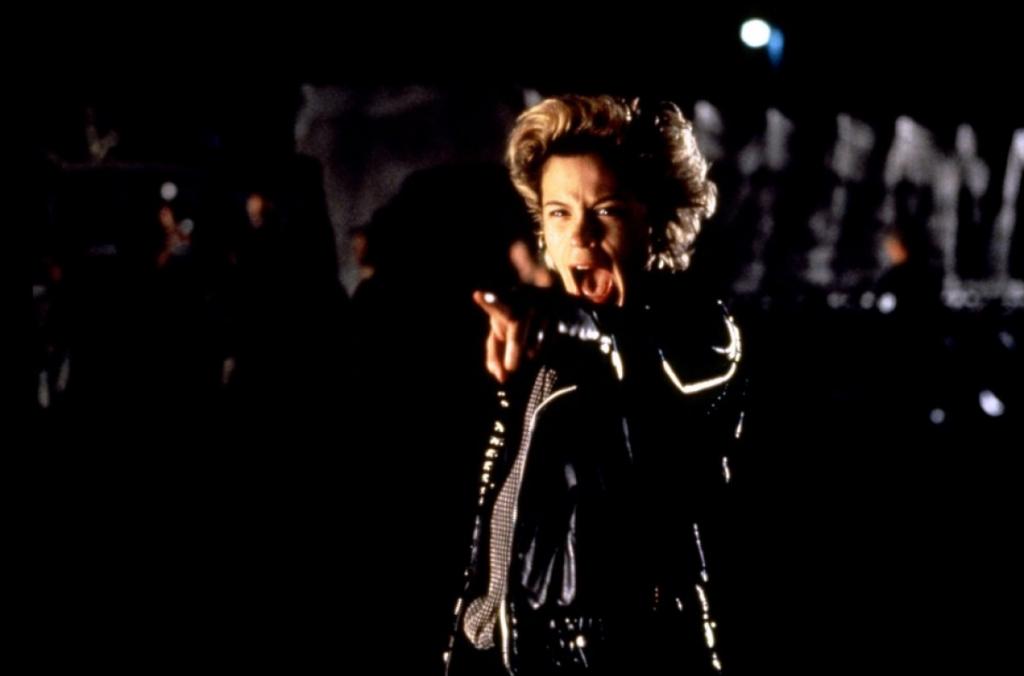5. Dominion: A Prequel to Exorcist (2005)

William Friedkin always thought the story ends with the first film and any kind of sequel, spin-off, or whatever would be unnecessary. He refused to watch them even but that of course didn’t stop the Hollywood machine, to mixed results. The second “Exorcist” film was mostly panned but it had fans like Scorsese. The third film by William Peter Blatty himself was probably good enough till it was ruined by the studio. Then there’s another one which is much less known by Paul Schrader called “Dominion”.
It was a hard film to make because Schrader did actually like the original (so did Roger Ebert, who gave it four stars) and he once said he can’t compete with Friedkin. Another reason is his cut was widely derided due to a lack of scares and gore. The studio at first opted to re-edit the film to make it scarier, which Schrader opposed and then they hired a different director which resulted in “Exorcist: The Beginning”. Schrader managed to finish his own version but on a very limited budget and short time. Still, the movie is good enough. The intro scene is particularly powerful and the casting choice of Stellan Skarsgard is spot on.
Roger Ebert was mostly impressed by Schrader’s film, writing that “it does something risky and daring in this time of jaded horror movies: It takes evil seriously.” He also said the film doesn’t lack scares, just Schrader doesn’t go with the traditional way: “In a lesser movie, there would be humid goings-on at the camp and a spectacular showdown between the humans and special effects. Not in the Schrader version, which trusts evil to be intrinsically fascinating and not in need of f/x enhancement.”
4. Wolfen (1981)

Thinking about it, 1981 was like the golden year for the genre with this, “An American Werewolf in London” and “The Howling” but the thing is, Roger Ebert only liked one of them.
Three of Whitley Strieber’s novels have been adapted to film and it’s interesting how different they are from each other. “Communion”, a non-fiction account of his alleged experiences with non-human entities was very silly but that aspect especially Christopher Walken’s performance made it somewhat entertaining to watch. “The Hunger” was a cool vampire film from the early 80s, artsy enough that one would be surprised how wildly different direction Tony Scott took in his directing career afterward. Then there’s “Wolfen”, arguably the best one out of the three. Unfortunately flopped at the box office, “Wolfen” is an unusually intelligent early 80s horror that combines the werewolf film formula with a police procedural.
Roger Ebert was highly impressed just like many other critics, saying this is “an uncommonly intelligent treatment of a theme that is usually just exploited, the movie arrived without much advance publicity.” He’s also impressed by how the film deals with the ecological message noting hoü the film “develops a strong, angry theme about ecological and human waste”. He thought it was a rather serious attempt at craftsmanship and not just another horror/werewolf film to shock the audiences with violence.
3. Stir of Echoes (1999)

Maybe they’d delay the release a little bit more, it could have benefited the box office success of other ghost stories following “The Sixth Sense” enjoyed, similar to “What Lies Beneath” and “The Others”.One could argue those films were hits also because they had a bigger star than Kevin Bacon but no, replacing him won’t work because his terrific performance is what makes the movie.
Based on the novel “A Stir of Echoes” by Richard Matheson whose other works have resulted in some other terrific films, this was David Koepp’s directorial effort. He wrote some awesome films but his filmography as a director was rather inconsistent with some films being totally unwatchable like “Mordecai”. But this one works brilliantly. The film has a compelling narrative that slowly takes you in and you keep wondering what’s going to happen in the end.
Ebert also praised Bacon’s performance by writing “Kevin Bacon is sometimes able to suggest characters who are being driven mad by themselves. Here he implodes in a role where that’s the right choice; another actor might have reached too far” and adds that it’s probably one of the actor’s best performances. Koepp and Bacon later collaborated for another horror film called “You Should Have Left.” If only it was half as good as this one.”Stir of Echoes” works because we want to know what happened to this girl he sees the ghost of and when we find out, it genuinely shocks us because how convincing Bacon’s paranoia and desperation to find out the truth was. We were totally on the same journey with him and we feel what his character feels.
2. Body Snatchers (1993)

Abel Ferrara has one of the most fascinating careers, his career is so unpredictable and even his failures are often intriguing and even thought-provoking. His only studio effort “Body Snatchers” might have sounded like an unusual choice for him but in fact, he was the man this material needed. We already have two great films from this premise, so why not a third? Ferrara’s stamp is all over the movie because it’s exactly how you imagine Ferrara would tackle this subject and that’s what makes it awesome. Roger Ebert was not too impressed by early Abel Ferrara, not even for “King of New York” but he gave for stars to “Bad Lieutenant” and once again for “Body Snatchers”.
The plot is centered around the discovery that people working at a military base in Alabama are being replaced by perfect physical imitations grown from plantlike pods. Some said Ferrara’s version is a warning against rising fascism in the country or the world, while Ebert thought it might be connected with the fear of AIDS. “Most important, for a horror film, there are scenes of genuine terror.” He says and indeed, this version feels more sinister than previous ones. Ebert admits film won’t be for everyone but “But as sheer moviemaking, it is skilled and knowing, and deserves the highest praise you can give a horror film: It works.” Hard to disagree with him here. Type of studio horror we rarely get, but then again, directors like Abel Ferrara are rare anyway.
1. May (2002)

Lucky McKee has recently directed an episode of Natasha Lyonne-led series “Poker Face” and it was a good one. There’s one more thing that connects him with the show, he had been friends with its creator Rian Johnson for decades and in fact, in Lucky’s directorial debut “May” the editor was no other than Johnson himself. As for the film itself, it was an outstanding one. Flopped at the box office, and largely overlooked by the mainstream audiences, “May” later developed a bit of a cult film status but it deserves more recognition because the movie is not even that inaccessible.
The film follows a young, strange girl named May Kennedy. She was born with an eye defect and made no friends as a child with an eye patch, making her a quirky adolescent. As an adult, her eye is corrected, but she still has no friends. Her attempts at connecting to society fail and it makes her have a deadly revenge.
Ebert noted that there will be people who compare the film to “Carrie” for its plot but this one is much different and mainly, not a supernatural horror film. He called the film “Fearless”, which indeed it is, saying “We expect some kind of a U-turn or cop-out, but no; the writer and director, Lucky McKee, never turn back from his story’s implacable logic.” Usually, when Ebert gives a four-star to a horror rating, chances are it’s something big or classic, but he didn’t hesitate to give his best score to “May”. He wrote it “is a horror film and something more and deeper, something disturbing and oddly moving.” Certainly right. After seeing the film for the first time, you’ll have two questions: Why it’s so underrated despite being obviously great? And why and how Angela Bettis didn’t become a bigger star?